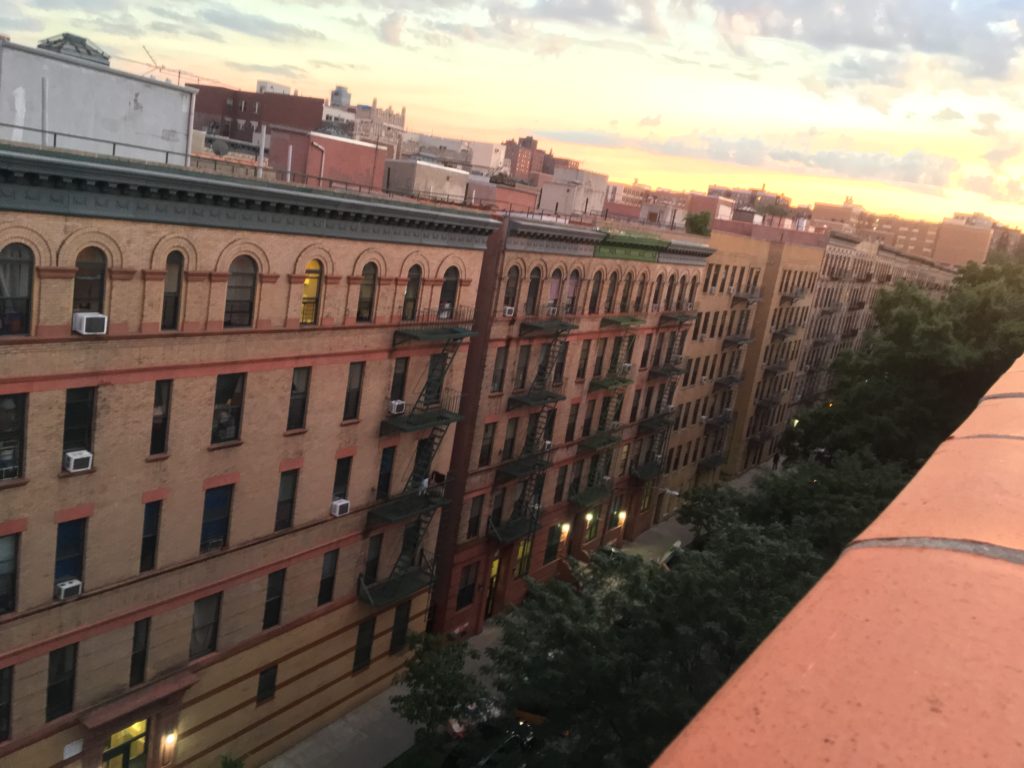It has been over a week since I started the internship at City Seminary in New York City, a young seminary committed to questions of the city as a space of spiritual and theological growth. Together with other members of the gallery team, I have been helping to set up the newest art exhibition in the seminary’s Walls-Ortiz gallery. The seminary uses this space as an opportunity to engage and invite neighbors in the Harlem community in relationship through the medium of art. This particular exhibition, titled “Planting for Peace,” draws attention to environmental justice and the tension between the earth under our feet and the urban systems that we created and rely on. As I settle into the rhythms of this preparation, I am also learning the rhythms of the city, and applying my thoughts on theology to this context.
There is a certain feeling that often envelops me and I will try to describe it. It is attached to the recognition that at this very moment, the very moment that I write this and again at the very moment that this is read, over seven billion individuals will be experiencing their own moments at the exact same time. And all of our experiences of these moments must differ greatly. Is this thought not heavy? Some of us will be exposed to intense suffering, and others to immense enjoyment. For some, it will be an unremarkable moment, for others it will be life-changing. I am sure I am not the only person who thinks of this idea. But to me, this is a meditation on humanity.
The more I think about it, the more the awareness grows. There are always more stories to imagine. At the very moment I sit down for a meal, someone has not eaten. At the same time I lay down on a mattress, someone else sleeps on a sidewalk.
In a city like New York this awareness is much more than a feeling. It is palpable and real. It confronts me on every street and out of every window. With eight million lives stacked on top of each other in neatly numbered apartment blocks, privacy is somewhat impossible. Intimate moments intermingle with the mundane and the necessity of the A Train at rush hour. I hear couples flirting and friends fighting. I overhear business calls and children being chastised. On the street, I get the thrill of passing a woman robed in full West African glory: yellow yards of twisted silk crowning her head, dress flowing behind her. Another woman whisks around me in a wheelchair, another in a pinstripe suit.
 The economic divide also looms in plain sight. On the blocks of West Harlem, where I spend most hours, new hipster coffee shops sprout around the barber shops and a Senegalese supermarket. A block away from the lines of Whole Foods, another line forms outside the food pantry. On the train ride home, a man who smelled of urine asked for change. No one acknowledged his request. No one even looked up at him.
The economic divide also looms in plain sight. On the blocks of West Harlem, where I spend most hours, new hipster coffee shops sprout around the barber shops and a Senegalese supermarket. A block away from the lines of Whole Foods, another line forms outside the food pantry. On the train ride home, a man who smelled of urine asked for change. No one acknowledged his request. No one even looked up at him.
It is easy to become desensitized by the sheer number of these encounters, full of personal moments and vulnerabilities. Desensitization is a common way of coping with the entanglement of lives in the city. When I witness these moments, I cannot help but feel small: an inconsequential piece in the scope of some greater cosmic narrative. I also wonder what responsibility I have to address the divide in the moments I encounter. Can it possibly be right to enjoy small luxuries knowing the expense of those who cannot afford to do so? How can I not feel contempt for those who live so lightly in the moments where I am in distress?
This kind of thinking may sound heavy, and it is rightly so. It challenges me to question a lifestyle that I can easily assume that I am entitled to. It challenges me with ever-evolving questions. What is my understanding of loving my neighbor? And what does the action of love look like when my neighbors and the moments that they live are each so diverse and so numerous? As a church are we prepared to understand humanity’s triumphs and trials as our own? Can we accept all of our injuries and injustices as collective and connected?
Yes, this is heavy, but it is essential if we believe that we see Jesus in the hungry, the homeless, and the marginalized. It can also be simple and freeing. To me, it is a meditation. Thinking of these moments and witnessing some of them, I also feel gratitude. Not because I feel more or less fortunate than those experiencing life around me, but because I get to share in that existence. It is a reason to stay present.
“If you have come here to help me, you are wasting your time. But if you have come because your liberation is bound up with mine, then let us work together”
– Lilla Watson, artist, activist, indigenous Australian
